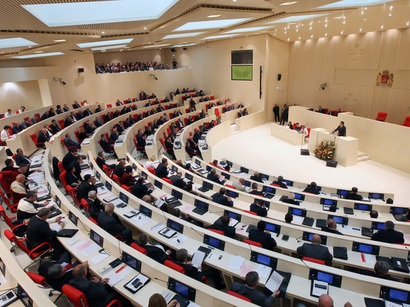Georgia’s anti-discrimination draft law in the spotlight

Dozens of non-governmental organisations (NGOs) are calling on the Georgian Government to make the anti-discrimination draft law more effective by creating mechanisms to fine those who commit discrimination.
At the same time, the Patriarch’s Office asked Parliament to postpone adopting the law.
Up to 40 organisations, including "Open Society Foundation" and "Transparency International Georgia" addressed Cabinet and Parliament today to equip the Public Defender, who was set to discuss discrimination cases to fine public institutions and private individuals through the court for implementing discrimination.
The organisations believed more time was necessary to discuss and evaluate the law otherwise the law would not be effective.
In response to the NGOs demand, Parliament Majority member Vakhtang Khmaladze said the Public Defender’s Office was not the right agency to fine someone. He said the Ombudsmen needed to be trusted and if he was able to punish someone, he would lose this trust.
"This law takes a model where the Public Defender has to check the discrimination cases. If the case refers to a violation that provides an administrative punishment or criminal one, only the court must impose sanctions on a person then," he said.
The draft law provided the following definition of discrimination:
"The Bill does not create any new legal material rights, instead it is aimed at ensuring the enjoyment of equal rights. The Bill prohibits any signs of discrimination including with the reason of age, health condition, disability, sexual orientation, gender identity, profession. The Bill bans discrimination in both, private and public sectors.”
NGOs said the law needed to provide more precise explanations for what discrimination signs were.
In response to this, Parliament Vice-Speaker Manana Kobakhidze said as the Bill was about elimination of all forms of discrimination, there was no need to specify its forms.
Meanwhile the Patriarch’s Office of Georgia issued a statement asking Parliament to postpone adopting the law.
The statement underlined violence and discrimination was unacceptable to the church of Georgia, as Christianity was a religion of love and was based on love and mutual respect.
However the Georgian Orthodox Church said: "From God’s commandments, the religious society fairly considers non-traditional sexual relations a deadly sin and the anti-discrimination bill as presented now is considered as propaganda and legitimizing of the sin."
"Introduction of a notion of ‘sexual orientation’ and ‘gender identity’ – non-existent in the constitution – into this bill, important for development of our country, triggers a huge anxiety in the people, because personal rights of our citizens are already equally protected by the existing Georgian legislation," the Patriarchate said.
It suggested further discussions should be held surrounding the issue.
Justice Minister Tea Tsulukiani also comments on the discussion today. In an interview with the TV company Maestro she explained that there was a list of signs of discrimination in the Georgian Constitution and all the minorities, including sexual or people with special needs, were mentioned as "and others”.
"The rights of all types of minorities are protected today by the Constitution; in the draft law the list will just be specified,” she said.
The Georgian Parliament will continue to discuss the draft law tomorrow. The Head of the Committee of the Human Rights Eka Beselia said lawmakers should explain each article of this law and society will be fully informed.
"We will avoid all misinterpretation in this case,” she said.
Georgia was strongly encouraged by the EU to adopt the anti-discrimination law.
The European Neighbourhood Policy (ENP) Country Progress Report 2013 for Georgia, published at the end of March, included a major recommendation that Georgia immediately adopt an anti-discrimination law in what would become a prerequisite for finalizing the Visa Liberalization Action Plan.
The report stated: "On the basis of this year’s report and with a view to sustain implementation of the ENP Action Plan in 2014, Georgia is invited to adopt comprehensive anti-discrimination legislation; ensure that the rights of people belonging to minorities, including religious minorities, are respected. Condemn instances of hate speech, attacks and violence against persons belonging to minorities; send clear messages of zero tolerance towards such behaviour."
 Tweet
Tweet  Share
Share